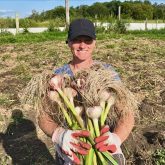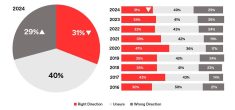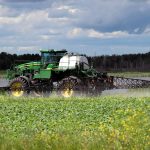The 1990s were the Good Old Days for Canadian potato industry. The U.S. economy was growing, providing strong markets just to the south — markets that were suddenly available as never before due to NAFTA. The Canadian dollar was in the tank, so you could sell in greenbacks and get 30 per cent more in loonies. New plants sprung up across the country to feed the seemingly endless American demand for french fries.
That’s all changed, says Frank Van Schaayk, McCain Foods regional president for the Americas. He told this winter’s Manitoba Potato Production days that many of the same factors are now working against potato production and processing in Canada, with a few wrinkles added. It was enough to cause Van Schaayk to indulge in a bit of self-deprecating nostalgia.
Read Also

CUSMA access key among other trade noise: Seeds Canada panel
Seeds Canada conference panelists say Canada needs to stay focused and wait as U.S. trade and tariff chaos develops, and a Canada-U.S.-Mexico Agreement review looms
“God, I wish the dollar was 63 cents again — that was easy and I thought I was smart,” he said with a chuckle.
With oil firmly lodged at or around $100 a barrel, however, Van Schaayk acknowledged this isn’t in the cards, and thus he says the Canadian potato industry needs to re-evaluate what the future is going to look like, in light of this new information.
European competition
One great starting point would be to acknowledge that the future won’t likely look much like the past, he told the growers in the audience. Rather than fondly remembering past victories, it’s better to be looking ahead at what can be done to lay the groundwork for new ones, he said.
“You can’t go back and make a brand-new start, but you can start right now and make a brand-new ending,” he said.
One of the key ingredients to the successes of the past was low production costs. But with a strong loonie, higher raw material costs and higher transportation costs, Canada now finds itself shut out of new markets and opportunities that it would have captured just a few years ago. Today they’re going to U.S. potato producers and processors in the Pacific northwest — or producers even farther afield.
“Europe is the low-cost shipping point to growth markets — ocean freight out of Rotterdam is extremely competitive,” Van Schaayk said. “They’re landing on the East Coast of of the U.S. and competing against PNW (Pacific Northwest) railed all across the continent. I’m not trying to depress you, but I need to set up exactly what we’re dealing with here.”
That European competition also extends to include new emerging markets in Latin America, where some of the most promising growth is found.
Back home in North America, the picture isn’t much prettier, Van Schaayk said. There potato consumption is under attack as a public-health disaster, promoting obesity (see related story). The humble spud is now being painted as a starchy ball of ill health rather than a wholesome and affordable way to feed people. Opponents are even trying to push it off the school lunch menus.
“This is a huge thing for our industry,” Van Schaayk said.
The thing that bothers him the most, he says, is that the campaign is being waged with information that is years and even decades out of date. For example, critics are claiming that fries are still loaded with trans fats, despite the fact the industry switched oils and all but eliminated the issue 15 years ago. It speaks to a need for the industry to get its message out, backed by sound research and science, he said.
“Any nut with an agenda can get up in front of a microphone and say we’re eating too many potatoes,” Van Schaayk said. “Facts don’t matter. Those are the circumstances that are in front of us.”
Continental approach
One way McCain is grappling with these issues is by refocusing its business on a continental basis, rooting out cost savings by eliminating needless duplication between Canadian and U.S. operations. In part it means taking a more business-oriented and systemic approach to a far-flung business that grew piecemeal over the course of many years.
“McCain has historically operated in a very decentralized way,” he said. “It used to be like you were a trader or explorer or something. You got in your canoe, they gave you a couple of blankets, some lamp oil and a bit of food and told you, ‘Go and explore that far-off land.’”
As the company developed in that fashion, however, inefficiencies began to creep in, Van Schaayk said. For example the company had 135 distinct batter products in its production lineup around the globe, when it actually only needed eight. It had 37 different and unique IT systems that couldn’t really “talk” to each other. And it had built-in animosity between some of the company’s distinct divisions.
“Years ago, the biggest fights we had were between the U.S. and Canadian parts of the company,” he said.
Today the company has a supply chain that’s been organized on a north-south axis, rather than the east-west one it had historically operated.
“It’s having a dramatic effect on how we supply our customers,” Van Schaayk said. “It’s moved us closer to our customers and driven down our overall cost to supply our customers.”
While much of this manoeuvring has been internal to the company, it will also affect suppliers, including farmers who supply raw potatoes. Right now North American raw potatoes are expensive compared to those from Europe. While there has to be movement somewhere, Van Schaayk hastened to add that this didn’t just mean wholesale cuts or that the company would be imposing solutions.
He said producers and the industry need to work co-operatively.
“We are in this together, and someone needs to find ways to collaborate and increase the competitiveness of our industry. Twenty years ago, it was still a local business. Now it’s global.”
If the company doesn’t take these steps, however, Van Schaayk says they’ll face some steep challenges — something recent experiences in the Brazilian market have underlined.
“In Brazil we went from a 60 per cent market share to a 40 per cent market share in a single year,” he said. “A third of that was from a domestic processor, and fair enough if someone wants to make that investment and take that risk — but the remaining two-thirds was from European competition.”



















